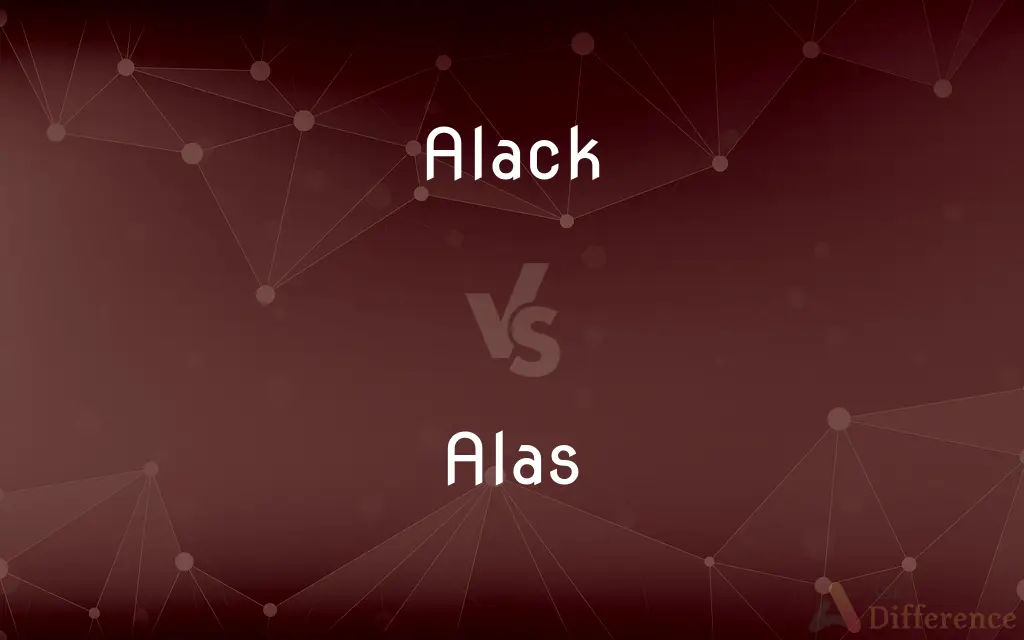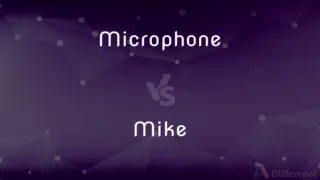Alack vs. Alas — What's the Difference?
By Fiza Rafique & Maham Liaqat — Updated on March 25, 2024
"Alack" is an archaic exclamation expressing regret or dismay, while "alas" is a more commonly used term today for expressing sorrow, grief, or concern.

Difference Between Alack and Alas
Table of Contents
ADVERTISEMENT
Key Differences
"Alack" is a term that has largely fallen out of modern English usage, once employed to express regret, disappointment, or dismay in response to unfortunate situations. Its usage was more prevalent in English literature and dialogue of past centuries, capturing a formal or stylized expression of negative emotions. On the other hand, "alas" remains in use as an exclamation to convey a sense of sorrow, grief, lamentation, or concern, often in a somewhat formal or poetic context. Both terms serve similar functions in expressing sadness or regret, but "alas" has sustained its relevance and is recognized in contemporary language.
While "alack" might be encountered in the reading of classical literature, poetry, or in the context of historical reenactments to evoke a specific period feel, "alas" is used in both written and spoken English today, albeit with a tone that might convey a heightened sense of emotion or formality. "Alas" can be found in modern literature, speeches, and even casual conversation when someone wants to emphasize their disappointment or sorrow about a situation.
The linguistic shift from "alack" to "alas" reflects broader changes in the English language, where some expressions become archaic and others evolve but retain their expressive power. This transition underlines how language adapts to cultural and temporal contexts, with "alas" enduring as a versatile expression for articulating a range of emotions, from mild regret to deep sorrow.
In terms of usage, both "alack" and "alas" are interjections, a part of speech used to express an emotion or sentiment, but their frequency and context of use have diverged over time. "Alas" often precedes an explanation of the regrettable circumstance or follows a statement to underscore the speaker's emotional response to the information.
While the core sentiment behind "alack" and "alas" is similar, their place in the modern lexicon differs significantly. "Alas" connects the contemporary speaker with a long tradition of English expression, maintaining its place in the emotional and rhetorical toolkit of the language, whereas "alack" provides a window into the linguistic past, offering insight into the expression of emotion and exclamation in historical contexts.
ADVERTISEMENT
Comparison Chart
Definition
Archaic term expressing regret or dismay.
Exclamation expressing sorrow, grief, or concern.
Current Usage
Rare, mostly found in historical or literary contexts.
Still used, though often with a formal or poetic tone.
Emotional Range
Primarily associated with regret and dismay.
Conveys a wider range of sorrowful emotions.
Context
Used in classical literature and historical texts.
Found in modern literature, speeches, and everyday language.
Tone
Formal, stylized expression of negative emotions.
Can be formal or poetic, versatile in expressing emotions.
Compare with Definitions
Alack
Expression of regret.
Alack, the day has turned sour with the news.
Alas
Lamentation.
Alas, we were too late to change the outcome.
Alack
Indicates dismay.
Alack, that such a deed could be thought.
Alas
Sorrowful exclamation.
Alas, my friend, I will miss you dearly.
Alack
Used to lament.
Alack, for I have lost my way in this venture.
Alas
Poetic sorrow.
Alas, the night is dark and full of terrors.
Alack
Archaic sorrow.
Alack, the hero falls before his prime.
Alas
Expressing grief.
Alas, the world is lesser without her.
Alack
Historical expression.
Alack, the times are hard and unforgiving.
Alas
Reflecting concern.
Alas, I fear we are on the brink of disaster.
Alack
Used to express regret or dismay.
Alas
Used to express grief, pity, or concern
Alas, my funds have some limitations
Alack
Used to express sorrow, regret, or alarm
"Whatever I long for makes me cry alack. / Whatever I wish, I quickly take it back" (Richard Wilbur).
Alas
Used to express sorrow, regret, grief, compassion, or apprehension of danger or evil.
Alack
An expression of sorrow or mourning.
Alas
A type of depression which occurs in Yakutia, formed by the subsidence of permafrost.
Alack
An exclamation expressive of sorrow.
Alas
An exclamation expressive of sorrow, pity, or apprehension of evil; - in old writers, sometimes followed by day or white; alas the day, like alack a day, or alas the white.
Alas
By bad luck;
Unfortunately it rained all day
Alas, I cannot stay
Common Curiosities
Can "alack" still be used in modern English?
While not common, "alack" can be used for stylistic or dramatic effect, particularly in literary or historical works.
What does "alack" mean?
"Alack" is an archaic exclamation used to express regret or dismay.
How is "alas" used today?
"Alas" is used to express sorrow, grief, or concern, often in a formal or poetic context.
What's the difference between "alack" and "alas"?
The main difference is in their current usage; "alack" is largely archaic, while "alas" is still in use today to express emotions.
Is "alas" considered old-fashioned?
"Alas" can sound formal or poetic, but it is still recognized and used in contemporary language to express a range of emotions.
Are there any synonyms for "alack" and "alas"?
Synonyms include "unfortunately," "sadly," and "regrettably," though these lack the poetic or formal tone of "alack" and "alas."
What emotional response do "alack" and "alas" convey?
Both convey negative emotions, with "alack" focusing on regret and dismay, and "alas" expressing a broader range of sorrowful emotions.
Why has "alas" remained in use but "alack" has not?
Language evolution favors terms that adapt well to changing cultural and communicative needs; "alas" has remained versatile and expressive.
How do cultural changes influence language like "alack" and "alas"?
Cultural and communicative needs shape language evolution, leading to the adoption or decline of certain expressions over time.
Can "alack" and "alas" be used interchangeably?
In historical or literary contexts, they might be used interchangeably to express regret or sorrow, but "alas" is more versatile in modern usage.
How do "alack" and "alas" fit into sentence structure?
Both are interjections and can precede or follow a statement to emphasize the speaker’s emotional reaction to the information.
In what type of literature would one most likely encounter "alack"?
"Alack" is typically found in classical literature, Shakespearean plays, and historical texts that reflect the language of earlier periods.
Is there a modern equivalent to "alack"?
Modern expressions of regret or dismay include "unfortunately" or "sadly," though they lack the specific historical or stylistic connotations of "alack."
What does the persistence of "alas" in language suggest about emotional expression?
The endurance of "alas" suggests a continuous need for expressive, versatile terms to convey complex emotional states and reactions.
Share Your Discovery

Previous Comparison
Microphone vs. Mike
Next Comparison
Investigative vs. InvestigatoryAuthor Spotlight
Written by
Fiza RafiqueFiza Rafique is a skilled content writer at AskDifference.com, where she meticulously refines and enhances written pieces. Drawing from her vast editorial expertise, Fiza ensures clarity, accuracy, and precision in every article. Passionate about language, she continually seeks to elevate the quality of content for readers worldwide.
Co-written by
Maham Liaqat














































